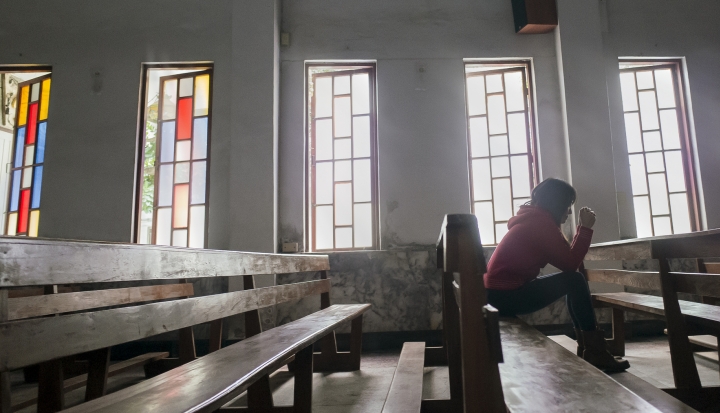I have a dear friend who, at 92, has been a priest for much longer than I have been alive. Talking about his priesthood once, I asked him, “What do we look like in the pews from up where you are?” He didn’t hesitate.
“Oh, it’s awful! I can see you thinking about your grocery lists and who’s going to let the dog out.” My friend never was one to pull punches, but advanced age really has liberated him.
He did go on to clarify. Of course he sees prayerfulness in the congregation at Mass, too. But his overall impression after decades on his side of the sanctuary is that too many of us are bored, disengaged, and going through the motions. But that is not the worst of it.
The crisis at work since last summer’s revelations about Theodore McCarrick has made clear that indifference among laypeople is far from the worst problem in the church. If we pause and reflect on it, what we know now about McCarrick is that he also seemed to be going through the motions.
Recent events seem to have revealed that McCarrick’s persistent and deeply immoral behavior was no obstacle to his work as a bishop. Despite the vestments, the ring, the pectoral cross, and every other outward sign, the Word of God did not penetrate his life to bring about real conversion in how he lives. The same seems to have been true of many bishops and priests around him. The acid corrosion of that truth now unleashed in the church among us is the real crisis we face.
Thinking about this, and as bishops from around the world meet in Rome with Pope Francis to address the crisis together on February 21–24, it seems to me that only one question really matters right now: Does the church, as it is today, lead women and men to holiness?
If we are honest, the picture is not encouraging. From bored disengagement in the pews to careerist hypocrisy among our hierarchical leaders, the evidence does not suggest strongly that we can say the church does lead us to holiness.
Let me be clear about what I mean by that.
The visible church in the world is the People of God, and holiness abounds among us. I have known and been amazed by holy people in the church. But the question is not whether God has given holy people to the church. The question, with two thousand years to have made the effort and work out how to do it, is whether the church’s institutions and structures are bringing people to holiness or whether holiness happens despite the familiar church that we all know.
Another friend put it this way. Recently he has found himself wondering, “When was the last time I was that excited about something the Catholic Church did?” As we talked, I wondered whether even those of us who still are in the pews every Sunday morning could conjure a satisfying or cheerful answer.
My purpose is not to pile up criticisms or to increase anyone’s discouragement. Neither do I wish to say that the church offers the world nothing but scandal. I work for a church organization. I live my life in the church. My wife and I are raising our family in the church, we send our children to Catholic schools because we want them to receive faith formation. I am one of those people in the pews every Sunday. I know what the church offers.
Yet, when we think about the challenging problem of bringing about holiness, it seems to me that we want to begin by asking what the church seems like to the people it hopes to sanctify. If we are not finding what we need, we need to start thinking about what we are going to do.
Alfred Delp (1907–1945) was a German Jesuit, imprisoned and executed by the Nazis for resistance activities. Delp was martyred for his scrupulous faith in the gospel. Yet from his cell, he was critical of a church that failed to be holy while the Nazis rose to power. Delp wrote that “recently a man turning to the church for enlightenment has all to often found only a tired man to receive him—a man who had the dishonesty to hide his fatigue under pious words and fervent gestures.”
Delp’s prison meditations have been in my mind as this most recent scandal has unfolded, and I recommend them as a place to start imagining where we can go from here. Delp offers no answers, only the stiff demands that the search for holiness makes on us. For him, that search led to the gallows. Maybe we are tempted to say something like, “Teacher, this saying is too hard” (John 6:60). But that could be a sign we are on the right track.
How many of us are looking for this challenge? How many of our church leaders want to offer it? What, finally, do we really believe about the church and ourselves? What kind of church do we want to belong to?
If we want a more attractive church, one better at leading women and men to holiness, we are going to have to be that church. You and me. We must commit ourselves fully, like active citizens who will not settle merely for “pious words and fervent gestures.” We must be Christians like Delp, as critical and rigorous about what we expect from the church as we are faithful to it.
Lukewarm Christianity will not be enough anymore, whether among our leaders or ourselves in the pews. To repair our broken church (which remains the best hope for our broken world), we must really live our baptismal calling every day. Like Delp, we must do it with integrity and we must not count the cost.
Our church is us. It will be what our real and lived faith makes it.
Image: Flickr cc via Jay Hsu















Add comment